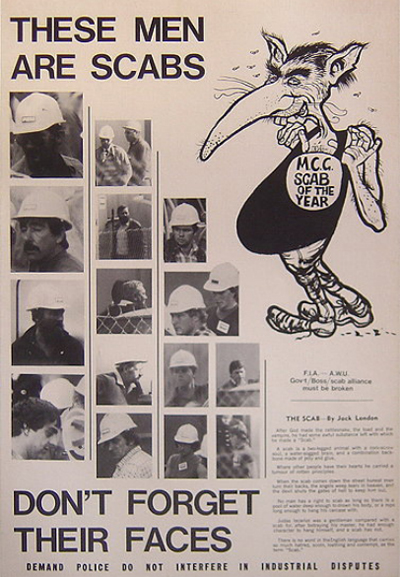The Scab

When it comes to coping with the degradations of late capitalism, nothing beats a meticulous skin care regimen. Specifically: scrubbing out scabs.
Yep, the epithet “scab” is back — and more reviled than ever. The magnifying mirror is out, and we’re all gazing at the mangy pelt of our workforce without mercy. Publicly refusing to support your colleagues’ union push? Scab. Ordering a pack of tube socks, a Kindle and a yoga mat on Amazon Prime Day amid warehouse strikes? Scab. Booking your NBA team a stay at a Marriott as the hotel chain’s workers walk off the job protesting for better conditions and wages? Scab. Blogging for Deadspin in the aftermath of the entire editorial staff resigning in protest of management? Definitely a scab!
Amid a resurgence of labor organizing and class consciousness, the word “scab” seems to have been revitalized and re-mainstreamed. In the process, it even seems to have evolved into something more capacious by default. Recently, the word has been flung at all perceived class traitors — not just strikebreakers but also customers who cross picket lines and people who espouse anti-labor sentiments. For a new generation of union enthusiasts and leftists, “scab” holds both the power of social shame and the flexibility to stigmatize all types of working-class treachery.
…
Erik Loomis, a historian at the University of Rhode Island and author of “A History of America in Ten Strikes,” told HuffPost that the decline of the labor movement followed by the rise of the new leftist movement in recent years has, he believes, led to the word being fuzzily resurrected.
“When you had strikes and strikebreakers as a major part of American life, scab meant something very specific,” he said. “The term ‘scab’ is something that has meaning to a lot of people, but it means more like ‘someone who doesn’t stand with the working class’ rather than ‘strikebreaker.’”
Others aren’t entirely convinced. “At this current point, people understand what a ‘scab’ is, but I have not heard the word referenced as much as in previous eras,” Meredith Katz, assistant professor of sociology at Virginia Commonwealth University, told HuffPost. She suggested that it would be a stretch to apply “scab” to a consumer crossing a picket line.
Gross, conversely, argued that no such shift has taken place because “scab” always applied to customers who ignored labor-driven boycotts. Perhaps this was simply more visible on the physical frontlines.
“When I was on the strike line with grocery workers in a protracted strike in 2003, they were definitely referring to customers crossing the picket line as scabs and I joined them happily in doing so,” he told HuffPost.
…
Whereas once the picket line may have been at the workplace — and frequently a workplace like a factory, where only workers are likely to be physically present — now the picket line can be anywhere. The same smartphone that allows you to summon an Uber or order Postmates can also pull up a stream of pro-strike commentary. A pithy insult like “scab” is perfectly suited for enforcing social norms on social platforms; like another epithet popular on these platforms, “cuck,” it’s a punchy one-syllable word with spiky edges. Snarky, visceral, eminently memeable, it’s easy to imagine delivered in a hiss, dripping in disdain.
Sure, Twitter isn’t everything. But it would also be a mistake to dismiss the burgeoning chatter of Twitter socialists and union partisans. Loomis argued that communities fostered online, often among people who haven’t even met, have fueled the widespread new enthusiasm for leftist politics.
“While I would agree, as many organizers would say, that there’s nothing like actually physically being with somebody in a protest or something like that for organizing potential and the spirit of solidarity that that creates,” Loomis said, “I don’t think you have a revived left in this way without the Internet.”
The meaning of words change and I don’t really care that people are expanding how the term is used, though there is a risk of turning it into the ridiculous, such as “if you don’t support my personal presidential favorite but rather support another pretty similar one, you are a scab supporting a scab.” But whatever, what will be, will be.


